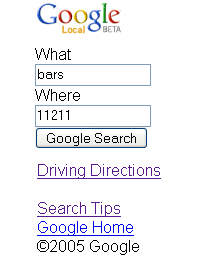 Google is making its local-search service available to mobile-toting users, offering maps and driving directions optimised for the wee screen.
Google is making its local-search service available to mobile-toting users, offering maps and driving directions optimised for the wee screen.
The nifty service – currently being publicly tested – lets nomadic users find local restaurants, stores and other businesses using their Web-enabled mobiles/PDAs equipped with suitable XHTML (Extensible HTML)-enabled browsers.
Using the service is simplicity itself, with a simple interface offering two boxes to enter “what” and “where” search terms, a search button and a link to get driving directions.
If you’re gasping for a Budweiser beer in Brooklyn, simply type ‘bar’ in the first box and the area’s zip code in the second and you’ll be presented with a helpful list of ten hostelries, with a ‘next’ button offering more locations.
Each search result offers the name, address and phone number of the bar and the distance from your location (sadly the service is currently only available for US and Canadian services).
As with Google local search results, clicking on the link for a result takes you to a page offering more detail about the business (there’s not much there at the moment, though).
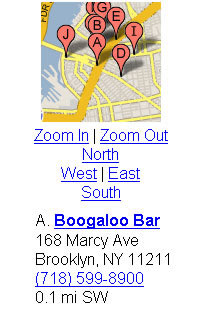 Telephone numbers are displayed as a hyperlink, and if the users’ phone supports the facility, clicking on the link will dial the listed telephone number (unlike some local search services, there is no additional charge for this).
Telephone numbers are displayed as a hyperlink, and if the users’ phone supports the facility, clicking on the link will dial the listed telephone number (unlike some local search services, there is no additional charge for this).
At the top of the page, a small map shows the locations of the bars listed, with each marked with a pushpin-like icon. A set of text links below lets you zoom in and pan around the local area.
Basic driving instructions can also be obtained by inputting your start and end addresses.
Naturally, such a genuinely useful service suggests a host of revenue earning possibilities, but Georges Harik, director of product management for Google declined to discuss future plans for sponsored listings, pay-per-call advertisements or other potential enhancements to the local mobile service.
Instead, the cryptic chappie stated that Google “plans to do whatever would be useful” for users of the service.
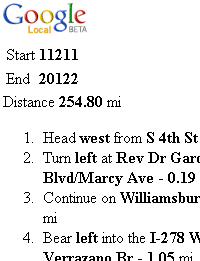 Local search services are set to be the big hot potato of 2005, with the Kelsey Group reporting that local search ad spending hit US$162 million (£85m/€125m) in 2004.
Local search services are set to be the big hot potato of 2005, with the Kelsey Group reporting that local search ad spending hit US$162 million (£85m/€125m) in 2004.
The local advertising market is predicted to reach US$5.1 billion in the United States by 2009, with local search advertising accounting for about two-thirds of the spend.
With Google’s arch-rivals, Yahoo, already offering a mobile search service, we can look forward to a glorious bun fight as the search engine giants ramp up the feature sets to woo customers. Bring it on!
 New figures by media researchers, Screen Digest, has shown that the mobile games market has scooped up £327m worth of funding since September 1999, 56% of which was raised during 2004.
New figures by media researchers, Screen Digest, has shown that the mobile games market has scooped up £327m worth of funding since September 1999, 56% of which was raised during 2004.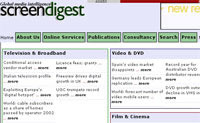 The growth of multimedia/web-enabled phones has supercharged consumer spending on downloadable mobile games, with sales growing from £380m (US$719m/€554m)in 2003 to £778m (US$1.4bnm/€1,134m) in 2004.
The growth of multimedia/web-enabled phones has supercharged consumer spending on downloadable mobile games, with sales growing from £380m (US$719m/€554m)in 2003 to £778m (US$1.4bnm/€1,134m) in 2004. TComm has launched a mobile TV service capable of delivering live, streamed and downloaded audio/video content to mobile phones.
TComm has launched a mobile TV service capable of delivering live, streamed and downloaded audio/video content to mobile phones.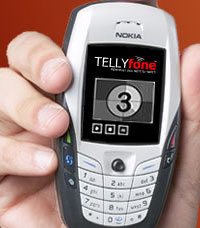 Subscribers currently have a choice of six premium channels with another eight channels rolling out over the next 60 days.
Subscribers currently have a choice of six premium channels with another eight channels rolling out over the next 60 days.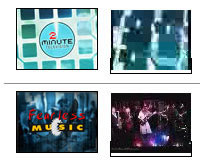 Tony Johnson, the Content Manager of TComm (UK) Limited, was on hand to lavish praise on his own service: “With content from UK and US production companies such as 2 Minute TV, Fearless Music, Sandy Frank Entertainment and Hungry Biker, TELLYfone sets a new standard in content provision for the mobile phone market.”
Tony Johnson, the Content Manager of TComm (UK) Limited, was on hand to lavish praise on his own service: “With content from UK and US production companies such as 2 Minute TV, Fearless Music, Sandy Frank Entertainment and Hungry Biker, TELLYfone sets a new standard in content provision for the mobile phone market.” A special promotion is offering free access to the service throughout April, after which access will be on a paid subscription basis.
A special promotion is offering free access to the service throughout April, after which access will be on a paid subscription basis. The whole caboodle measures only 55mm x 37mm x 13mm and is designed to mount inside a 1DIN radio/CD player.
The whole caboodle measures only 55mm x 37mm x 13mm and is designed to mount inside a 1DIN radio/CD player. It must be tough trying to get noticed in the crowded MP3 player market.
It must be tough trying to get noticed in the crowded MP3 player market. The new teensy-weensy MobiBlu DAH-1500 player apparently offers MP3 and WMA support, a FM tuner and a claimed 15- 20 hours battery life (we say ‘apparently’ because our Japanese translation skills aren’t too good).
The new teensy-weensy MobiBlu DAH-1500 player apparently offers MP3 and WMA support, a FM tuner and a claimed 15- 20 hours battery life (we say ‘apparently’ because our Japanese translation skills aren’t too good). If users manage to avoid dunking the player, their publicity photos also suggest they can wear the device as a head tilting earring or lug it around the neck as a clunky necklace. Cool, or err, what?
If users manage to avoid dunking the player, their publicity photos also suggest they can wear the device as a head tilting earring or lug it around the neck as a clunky necklace. Cool, or err, what? A study by Nielsen Entertainment has revealed that men spend more money on video games than they do on music, adding weight to a growing belief that video games are displacing other forms of media for the notoriously fickle attentions of young men.
A study by Nielsen Entertainment has revealed that men spend more money on video games than they do on music, adding weight to a growing belief that video games are displacing other forms of media for the notoriously fickle attentions of young men. Naturally, advertisers are keen to cash in on the rising popularity of games, and are looking at ever more persuasive ways to bombard bedroom-bound, bunglesome boys with beguiling adverts (branded billboards in race games are already commonplace, as we’ve
Naturally, advertisers are keen to cash in on the rising popularity of games, and are looking at ever more persuasive ways to bombard bedroom-bound, bunglesome boys with beguiling adverts (branded billboards in race games are already commonplace, as we’ve  Overall, Nielsen reported that active gamers tend to spend just over 5 hours a week playing alone and 3 hours a week playing with people or online.
Overall, Nielsen reported that active gamers tend to spend just over 5 hours a week playing alone and 3 hours a week playing with people or online. UK Online is hoping to bring broadband to the masses by smashing the price point for “entry-level” home broadband down to a wallet-untroubling £10 a month.
UK Online is hoping to bring broadband to the masses by smashing the price point for “entry-level” home broadband down to a wallet-untroubling £10 a month. Surfers not used to this level of generosity may be wondering where the catch is, but we haven’t found it yet: we wrote to UK Online and they confirmed that both the Broadband 500 and Broadband 2000 are unlimited services with the Broadband 8000 offering an enormous 500GB monthly download allowance.
Surfers not used to this level of generosity may be wondering where the catch is, but we haven’t found it yet: we wrote to UK Online and they confirmed that both the Broadband 500 and Broadband 2000 are unlimited services with the Broadband 8000 offering an enormous 500GB monthly download allowance. Canary Wireless have released their Digital Hotspotter device, which, as the name suggests, is a WiFi detection and analysis tool.
Canary Wireless have released their Digital Hotspotter device, which, as the name suggests, is a WiFi detection and analysis tool.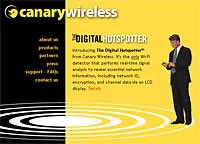 To scan for more networks, bash the button again.
To scan for more networks, bash the button again. And while we can’t disagree with Ben’s summary, we wonder how long it will be before laptop makers start fitting WiFi sniffers into machine cases to let users seek out accessible networks without going through all the palaver of booting up.
And while we can’t disagree with Ben’s summary, we wonder how long it will be before laptop makers start fitting WiFi sniffers into machine cases to let users seek out accessible networks without going through all the palaver of booting up. Google has started dishing out factual answers for some queries at the top of its results page, thus sparing click-weary users the hassle of navigating to other sites to look up the information.
Google has started dishing out factual answers for some queries at the top of its results page, thus sparing click-weary users the hassle of navigating to other sites to look up the information. Norvig went on to explain that Google feeds the service with information from Web sites they considers to be reliable, but it’s yet to establish formal relationships with any of the sites providing the content.
Norvig went on to explain that Google feeds the service with information from Web sites they considers to be reliable, but it’s yet to establish formal relationships with any of the sites providing the content. A hard drive, containing confidential data belonging to the Brandenburg police in Germany, was auctioned over eBay and bought by a student from the city of Potsdam for €20 (us$25/£14) according to a report by Spiegel, a leading weekly German newspaper.
A hard drive, containing confidential data belonging to the Brandenburg police in Germany, was auctioned over eBay and bought by a student from the city of Potsdam for €20 (us$25/£14) according to a report by Spiegel, a leading weekly German newspaper. Last year, mobile security specialists Pointsec bought a load of hard drives off Internet auctions like eBay to find out how much sensitive company information they could unearth (and publicise their expertise in the bargain, natch).
Last year, mobile security specialists Pointsec bought a load of hard drives off Internet auctions like eBay to find out how much sensitive company information they could unearth (and publicise their expertise in the bargain, natch).